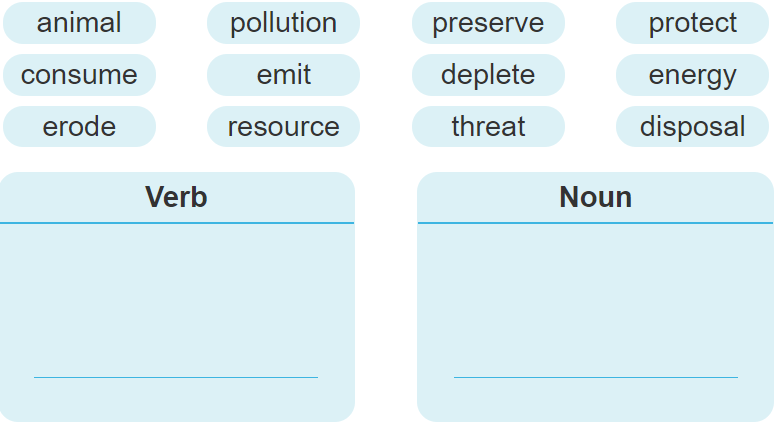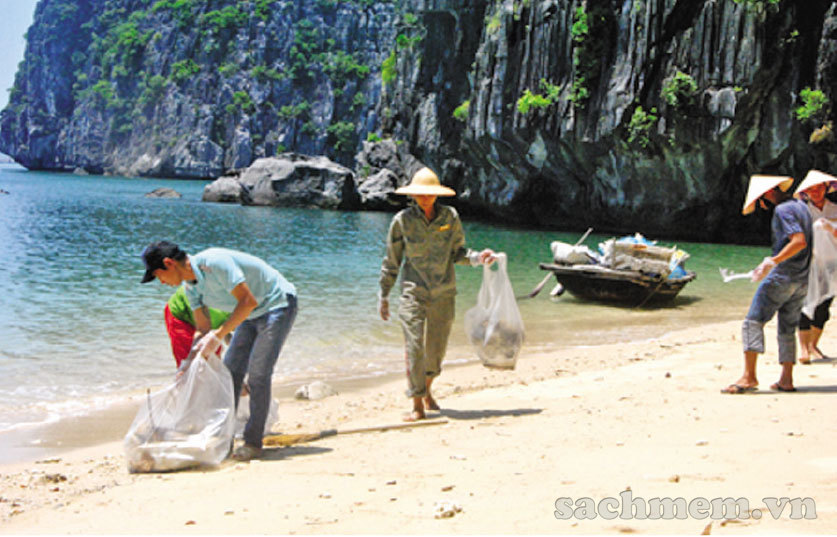Pronunciation 1
Video hướng dẫn giải
1. Listen and repeat.
(Nghe và lặp lại.)
|
1. pollution (ô nhiễm) |
2. erosion (xói mòn) |
|
3. energy (năng lượng) |
4. animal (động vật) |
|
5. consumption (tiêu thụ) |
6. awareness (nhận thức) |
|
7. poverty (nghèo đói) |
8. depletion (cạn kiệt) |
|
9. solution (giải pháp) |
10. protection (bảo vệ) |
Lời giải chi tiết:
Pronunciation 2
Video hướng dẫn giải
2. Put a mark (') before the stressed syllable in each of the words in 1. Then listen and check your answers.
(Đặt dấu nhấn trước âm nhấn trong mỗi từ ở mục 1. Sau đó nghe và kiểm tra câu trả lời của em.)
Lời giải chi tiết:
|
1. po'llution |
2. e'rosion |
3. ’energy |
|
4. 'animal |
5. con'sumption |
6. a'wareness |
|
7. 'poverty |
8. de'pletion |
9. so'lution |
|
10. pro'tection |
|
|
Vocabulary 1
Video hướng dẫn giải
1. Group the words according to their class.
(Nhóm các từ theo loại (từ) của chúng.)

Lời giải chi tiết:
|
Verb (Động từ) |
Noun (Danh từ) |
|
preserve (giữ gìn) protect (bảo vệ) consume (tiêu thụ) emit (tỏa ra) deplete (dùng hết) erode (xói mòn) |
animal (động vật) pollution (sự ô nhiễm) energy (năng lượng) resource (nguồn) threat (sự đe dọa) disposal (sự thải ra ngoài) |
Vocabulary 2
Video hướng dẫn giải
2. Complete the sentences using the correct words in brackets.
(Hoàn thành những câu này bằng cách sử dụng những từ chính xác trong ngoặc đơn.)
1. Water is one of the limited natural resources which can run out soon. All efforts should be made to _________ it. (preserve / preservation)
2. Disposal of solid waste into the local river has been the cause of water _________ in this area. (pollute / pollution)
3. _________ of environmental preservation should be raised in the public as well as in education. (aware / awareness)
4. We should _________ the limited or non-renewable natural resources for our future generations. (protection / protect)
5. The energy _________ of the community has increased since the new resort was built. (consume / consumption)
6. Over-exploitation of oil will lead to the _________ of this natural resource. (depletion / deplete)
Lời giải chi tiết:
|
1. preserve |
2. pollution |
3. awareness |
|
4. protect |
5. consumption |
6. depletion |
1. Water is one of the limited natural resources which can run out soon. All efforts should be made to preserve it.
(Nước là một trong những nguồn tài nguyên thiên nhiên có giới hạn mà có thể cạn kiệt sớm. Tất cả nỗ lực nên được thực hiện để bảo tồn nó.)
Giải thích:Sau to cần 1 động từ => preserve (v): bảo tồn
2. Disposal of solid waste into the local river has been the cause of water pollution in this area.
(Việc bỏ rác thải chất rắn ở sông là nguyên nhân ô nhiễm nguồn nước ở khu vực này.)
Giải thích: Sau danh từ "water" cần 1 danh từ nữa để tạo thành cụm danh từ => water pollution: ô nhiễm nước
3. Awareness of environmental preservation should be raised in the public as well as in education.
(Nhận thức về việc bảo tồn môi trường nên được gia tăng trong công chúng cũng như trong giáo dục.)
Giải thích: Đứng ở đầu cầu cần danh từ để đóng vai trò chủ ngữ => awareness (n): sự nhận thức
4. We should protect the limited or non-renewable natural resources for our future generations.
(Chúng ta nên bảo vệ nguồn tài nguyên thiên không tái tạo (không làm mới) được và có giới hạn cho các thế hệ tương lai của chúng ta.)
Giải thích: Sau động từ khuyết thiếu "should" là 1 động từ => protect (v): bảo vệ
5. The energy consumption of the community has increased since the new resort was built.
(Việc tiêu thụ năng lượng của cộng đồng đã gia tăng kể từ khi khu nghỉ dưỡng mới được xây dựng.)
Giải thích: Trước giới từ "of" cần 1 danh từ => consumption (n): sự tiêu thụ
6. Over-exploitation of oil will lead to the depletion of this natural resource.
(Việc khai thác dầu quá mức sẽ dẫn đến việc cạn kiệt tài nguyên thiên nhiên này.)
Giải thích: Trước of và sau the cần 1 danh từ => depletion (n): sự cạn kiệt
Grammar 1
Video hướng dẫn giải
1. Read the story. Underline the sentences said by Nick, Mary and Mr Jones.
(Đọc câu chuyện. Gạch dưới những câu được Nick, Mary và ông Jones nói.)

Mr Jones is aware of the need for environmental protection. He has two children, Nick and Mary. One weekend, the family went to the beach to have a picnic. The seashore was much polluted because of the amount of waste left there. Mr Jones was very sad. He said, ‘All this rubbish is killing fish and other sea creatures.' Nick immediately said, ‘We can clean the beach together.' Mary said, ‘I will ask our friends and neighbours to come and help us.' Mr Jones was very happy that his children wanted to help. He said, ‘I'm so happy to hear that, children.' The following week, the family came back to the beach with many of their friends and neighbours. They also brought big carrier bags. Mr Jones gave them gloves and told them, ‘Protect yourselves from germs.'
Phương pháp giải:
Tạm dịch:
Ông Jones nhận thức được việc cần thiết bảo vệ môi trường. Ông có hai đứa con là Nick và Mary. Vào một cuối tuần, gia đình đến bãi biển để đi dã ngoại. Bờ biển bị ô nhiễm nặng vì số rác thải bị bỏ lại đó. Ông Jones rất buồn, ông nói: “Tất cá số rác này đang giết cá và những sinh vât biển khác.” Nick liền nói: “Chúng ta cố thể cùng nhau làm sạch bờ biển.” Mary nói: “Con sẽ nhờ/kêu gọi ban bè và hàng xóm đến giúp chúng ta.” ông Jones rất vui là bọn trẻ muốn giúp đỡ. Ồng nói: “Bố rất vui khi nghe điều đó các con à.” Một tuần sau, gia đình trở lại bờ biển với nhiều bạn bè và hàng xóm của họ. Họ cũng mang theo những túi đựng lớn. Ông Jones đưa cho họ găng tay và nói “Bảo vệ chính chúng ta khỏi vi trùng.”
Lời giải chi tiết:
Mr Jones is aware of the need for environmental protection. He has two children, Nick and Mary. One weekend, the family went to the beach to have a picnic. The seashore was much polluted because of the amount of waste left there. Mr Jones was very sad. He said, ‘All this rubbish is killing fish and other sea creatures.’ Nick immediately said, ‘We can clean the beach together.’ Mary said, ‘I will ask our friends and neighbours to come and help us.’ Mr Jones was very happy that his children wanted to help. He said, ‘I’m so happy to hear that, children.’ The following week, the family came back to the beach with many of their friends and neighbours. They also brought big carrier bags. Mr Jones gave them gloves and told them, ‘Protect yourselves from germs.’
Grammar 2
Video hướng dẫn giải
2. Report what Nick, Mary and Mr Jones said.
(Đọc những gì Nick, Mary và ông Jones nói.)
1. Mr Jones was very sad and said ___________.
2. Nick said ___________.
3. Mary told them ___________.
4. Mr Jones told his children ___________.
5. Mr Jones gave the family's friends neighbours gloves and told them ___________.
Lời giải chi tiết:
1. Mr Jones was very sad and said that all that rubbish was killing fish and other sea creatures.
(Ông Jones rất buồn và nối rằng tất cả sô rác này đang giết cá và những sinh vật biển khác.)
2. Nick said that they could clean the beach together.
(Nick nói rằng chúng có thể cùng nhau làm sạch bờ biển.)
3. Mary told them she would ask their friends and neighbours to come and help them.
(Mary nói với họ rằng cô ấy sẽ nhờ kêu gọi bạn bè và hàng xóm đến giúp họ.)
4. Mr Jones told his children he was so happy to hear that.
(Ông Jones nói với bọn trề rằng ông rất vui khi nghe điều đó.)
5. Mr Jones gave the people gloves and told them to protect themselves from germs.
(Ông Jones đưa cho mọi người găng tay và nói họ bảo vệ chính mình khỏi vi trùng.)
Từ vựng
1. ![]()
2. ![]()
3. ![]()
4. ![]()
5. ![]()
6. ![]()
7. ![]()
8. ![]()
